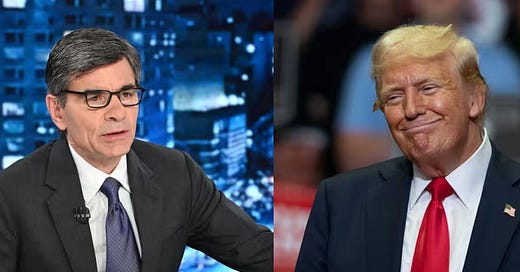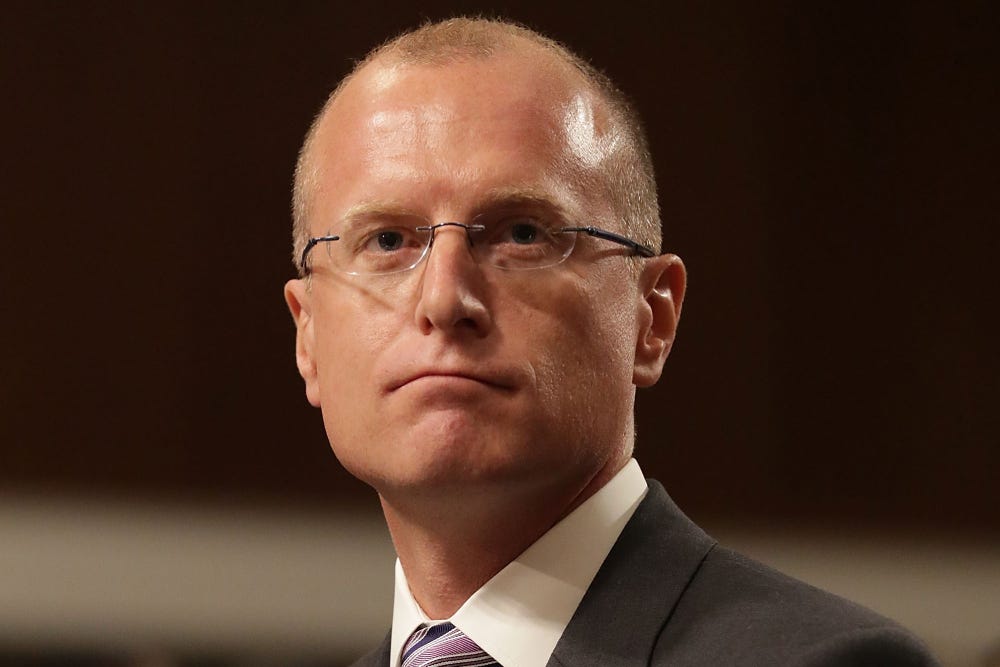Over the years, when major TV networks have displeased Donald J. Trump, he has been quick to respond.
After moderators on ABC fact-checked his false statements during a presidential candidate debate in September, he called the network “dishonest” and railed against it on Fox. “To be honest they are a news organization, they have to be licensed. They ought to take away their license for the way they did that,” he said on Fox & Friends.
Then, he took umbrage at CBS for an editing decision in an interview with Kamala Harris, saying it should lose its broadcast license. And, a few weeks before the general election, he went on his Truth Social to expand his targets to include not only CBS, but also “all other Broadcast Licenses.”
The TV-sensitive Trump’s attacks followed those from as far back as 2017, when he tweeted: “With all of the Fake News coming out of NBC and the Networks, at what point is it appropriate to challenge their License? Bad for Country!,” followed by “Network news has become so partisan, distorted and fake that licenses must be challenged and, if appropriate, revoked. Not fair to public!”
So, now that the once and future president will again wield influence over the ostensibly independent Federal Communications Commission, is it any wonder that ABC has kowtowed to him in agreeing to pay $16 million to settle a defamation suit he brought? Indeed, Trump just named a new chair for the commission, Brendan Carr, a Project 2025 contributor who has said networks should be punished for political bias.
Just how much power Trump, Carr and the FCC will have over the networks is in dispute. The networks don’t need licenses to operate, even though local affiliate stations do.
And, while the White House doesn’t control FCC decisions, it does appoint the five commission members. Surely, the other four will be parrots for Carr, who is already firing shots across the bow. The Republican operative and Trump toady just wrote on X that “broadcast media have had the privilege of using a scarce and valuable public resource — our airwaves. In turn, they are required by law to operate in the public interest.” As chairman, he added, “the FCC will enforce this public interest obligation.”
Moreover, Trump’s Department of Justice will have power over corporate media deals. Recall that in his first term Trump tried to block AT&T’s acquisition of CNN’s owner, Time Warner (though Justice’s antitrust division failed in that effort in court). That potent lever could bode ill for ABC and the other networks.
Even while presidents are somewhat hemmed in by longstanding free speech protections, there’s no doubt that Trump, as president again, can make life very tough for broadcast media. Tom Wheeler, FCC chairman from 2013 to 2017, told The New York Times that Trump’s threats could create a “chilling effect” on how news organizations make editorial calls.
“It is hard to yank a license; it is particularly hard to yank a license on the instruction of the president of the United States,” Wheeler said. “But it is not hard to have an impact on decision making.”
So, ABC’s decision, while alarming to believers in a free press, is not surprising. The case at issue turns on politics, lust and semantics.
Anchor George Stephanopoulos last spring repeatedly referred to Trump as being “liable for rape” after a jury found him liable for “sexual abuse” in a mid-1990s assault on writer E. Jean Carroll. Without her consent, Trump had penetrated Carroll with his finger in an assault in a New York department store dressing room. While Trump objected to the term “rape,” the judge in the case acknowledged that the terms were interchangeable in real-world use, even though they were legally distinct.
“The finding that Ms. Carroll failed to prove that she was ‘raped’ within the meaning of the New York Penal Law does not mean that she failed to prove that Mr. Trump ‘raped’ her as many people commonly understand the word ‘rape,’” Judge Lewis A. Kaplan wrote. “Indeed, as the evidence at trial recounted below makes clear, the jury found that Mr. Trump in fact did exactly that.” Kaplan said New York’s legal definition of “rape” is “far narrower” than the word is understood in “common modern parlance.”
Trump still owes Carroll nearly $90 million, plus interest, in the matter. He was found liable for that because he defamed her, according to two juries. Of course, the litigious mogul is appealing and may be hoping a friendly judiciary — one larded with his appointees — will vindicate him.
The facts, and Kaplan’s comments in a binding ruling, suggest that ABC likely would have had a good case, had it stood its ground and fought. Indeed, had Trump lost the election, it’s hard to see how the network would have bent the knee as it has. But, as president, Trump will just have too much power over it, network executives seem to think.
From a purely financial standpoint, moreover, the $16 million is peanuts compared with what litigating the case would cost. And it’s notable that $15 million will not go directly to Trump, but rather to his future presidential foundation and museum ($1 million goes to legal fees). Notably, neither Stephanopoulos nor the network apologized for the comments, saying only that they “regret” them.
It is a far cry from the $787 million that Fox agreed to pay Dominion Voting Systems for defaming the company in its dishonest and incorrect reporting. “The truth matters. Lies have consequences,” the company’s lawyer said in discussing the settlement.
It’s a bit surprising, in fact, that Trump didn’t press for more money or to have it go directly into his pockets. But it seems likely that he valued the PR effect and his ability to crow about the deal to his followers even more. He also may not have relished the idea of prolonged litigation that drew still more attention to his longstanding sexual depravity.
Is this all appalling, nonetheless? Unquestionably.
Much as the decisions by the owners of The Washington Post and the Los Angeles Times to kill editorial page endorsements of Kamala Harris, ABC’s action seems like another case of what Yale historian Timothy Snyder calls “anticipatory obedience.” This is where organizations or individuals facing a tyrannical leader rush to yield in hopes he will not crush them.
“Most of the power of authoritarianism is freely given,” Snyder writes in his book On Tyranny. “In times like these, individuals think ahead about what a more repressive government will want, and then offer themselves without being asked. A citizen who adapts in this way is teaching power what it can do.”
For those counting on the press to act as a guardrail against Trump’s excesses, the ABC decision seems craven, at best. It’s of a piece with the steady stream of major execs rushing to kiss Trump’s, ahem, ring by jetting off to Mar-a-Lago to dine with him and donate to his inaugural fund. Perhaps the most shameful is the $1 million donation by Washington Post owner Jeff Bezos.
What’s more, it’s not at all clear that ABC’s choice will make any difference over the coming four years. The notoriously thin-skinned Trump may yet threaten its ability to broadcast the truth when something else offends him.
Sadly, we can be sure that the journalists there will second-guess everything they do now to try to avoid irking the king. That’s the way tyrants work. Self-censorship, authoritarians across the world have found, is the best kind.
With a Trumpist Senate, House and judiciary, the incoming president will have extraordinary power to shape the laws and practices we follow. With decisions such as ABC’s, he may also in effect hold sway over the reporting and discussion of any of his efforts, perverting reports to suit his often distorted view of reality.
Will the media be able any longer to shine a light on the truth? Will more print media fall in line behind the Times, Post and ABC? And just how much of a difference will that make, in any case?
As shown by an election in which a bit over 49 percent of voters ignored or dismissed a ceaseless cascade of troublesome headlines and broadcast stories, the media is far less of a counterweight than it once was or should be. In their thrall to a strongman, far too much of the public — though not quite a majority — simply doesn’t seem to care about facts.
It’s hard to find reason for optimism, for hope that things could change for the better with Trump holding the whip hand at the moment. Still, in our electoral system, little is forever. Enough voters may care about reality that things could change with the midterm elections in a couple years. Certainly, that happened in Trump’s first term and in 2020.
In the end, Trump may have just a couple years to cow networks and intimidate journalists. But, as the ABC decision suggests, a tyrant to whom all kneel can do a lot of damage. Will his loathsome handiwork prove to be lasting? We’ll all have to stay tuned for that.








Trump and Hitler: Frail Leaders, Big Lies, and the Press Under Siege
Donald Trump’s latest tantrum against the press—threatening lawsuits and jail for journalists—is a sad echo of Adolf Hitler's more violent war on media freedom. Trump, like Hitler, cannot abide criticism. Both men, frail and insecure, have decided that the best way to protect their fragile egos is by attacking the very foundation of democracy: a free press.
Trump has launched a series of defamation lawsuits against media outlets he dislikes, including one against ABC over a factual error and another against the Des Moines Register for publishing a poll he didn’t like. It's a classic move for a man who can’t handle the truth: if the press doesn't bow to you, sue them into submission. But Trump's strategy isn't just about seeking justice—it’s about using the legal system to drown out dissent. And with his pick for FBI director promising retribution against journalists, the chilling effect is already here.
Hitler, meanwhile, didn’t bother with lawsuits. He simply seized control. The Reich Press Law of 1933 turned independent journalism into state-approved propaganda, and anyone who resisted was either silenced or executed. No lawsuits needed—just the brute force of a regime that crushed free speech under the weight of its own delusions of grandeur. The Nazis even had their own term for “fake news”: Lügenpresse (lying press), a phrase weaponized to delegitimize dissent and discredit the media entirely.
Both leaders, in their own ways, use the media as a scapegoat for their insecurities. Trump calls the press “fake news” whenever it dares to report facts he dislikes, just as Hitler's Reich Ministry of Propaganda spun every inconvenient truth into a lie. Neither man can stomach the idea that their weak, insecure leadership might actually be questioned.
Tyranny doesn’t spring up overnight; it’s built piece by piece, first with threats and then with silence. Trump and Hitler are cut from the same cloth: insecure, petty men who would rather rule with fear than face the truth. Their war on the press is the first step in eroding democracy itself—and it must be resisted at all costs.
For a deeper look into how Trump’s tactics echo those of pre-WWII Hitler, read my full article here: https://substack.com/home/post/p-153103008.
It explores their shared strategies of exploiting grievances, manipulating followers, and undermining democracy.
Subscribe for more insights on the dangerous rise of authoritarianism and the fight to protect our freedoms.
Business or, rather, money doth make cowards of us all.